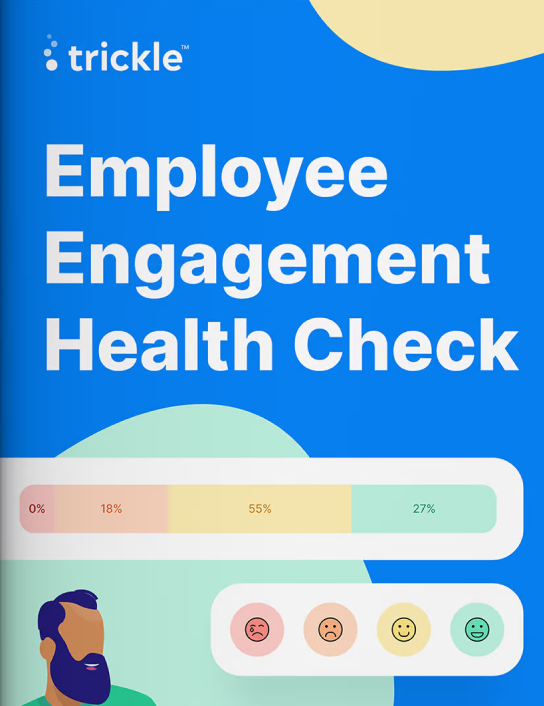How well does your company engage its employees?
Take your health check and find out.


Have you ever found it hard to finish work on time? replied to work emails while on leave, taken time off rather than call in sick? or found yourself unable to comfortably switch off after work?
If you answered yes to any of these then you have experienced leaveism.
Closely linked to presenteeism, leaveism is a relatively new phenomenon where employees continue to work outside of office hours to complete tasks as they are unwilling to admit their workload is too heavy.[1]
People will misuse flexitime, annual leave, or rest days to simply keep on top of their workload while coping with responsibilities at home, such as taking care of sick children or elderly relatives.
The pandemic has exacerbated the problem of leaveism significantly by further blurring the lines between work life and home life.
Restrictions and uncertainties caused by the virus have seen the number of people remote working and the level of job insecurity rise sharply.
As a result, people are feeling the pressure to perform at work more than ever, which is leading many to overcompensate, which can swiftly lead to burn out and reduced performance.
Leaveism is a growing problem in the UK, a recent report by Deloitte found that 51% of UK employees were working outside contracted hours in order to complete their work.[2]
While 63% of respondents to the CIPD’s recent Health and Well-Being at Work Survey said they had observed leaveism being practised within their organisation, more worryingly, 55% said their organisation had taken no measures to address the issue.[3]
Unlike Absenteeism, leaveism can be hard to identify or measure. Employees often do not want to speak up or admit they are unable to complete their workload during allocated office hours due to anxiety that such an admission could damage their work reputation.
Another reason people do not speak up is that they are keen to make a good impression on their employers and do not want to be perceived as “not being up to the task” or simply failing.
Only 49% of employees said they felt comfortable talking directly to their line manager about mental health and wellbeing issues, according to a recent Business in the Community 2019 Mental Health at Work report.[4]
If employees do not trust or have a good relationship with their line-manager, they become even more reluctant to ask for the support they need.
With 64% of the global workforce facing high anxiety over their personal job security due to the economic uncertainty caused by Covid-19, it is likely leaveism will become increasingly more difficult to address.[5]
When tough decisions and job cuts are being made, nobody wants to appear like they are the weak link incase it increases their risk of being let go.
Organisations should take the problem of leaveism seriously; if people cannot disconnect or raise an issue, it could have a long-term negative impact on their wellbeing, morale, and mental health.
If left unaddressed, leaveism can also distort the true picture of an organisation’s productivity, employee engagement, workplace wellbeing, and job satisfaction, all of which are connected to business performance.
Business leaders will not be able to make informed or effective decisions if they plan a corrective action based on inaccurate data.
Organisations can reduce leaveism actively by listening, engaging and collaborating with their people as they address the pressures that cause and exacerbate issues.
When it comes to committing time, effort and cash into fixing the problem, it can be hard for HR to justify the expense as organisations often struggle to measure the impact of wellbeing strategies or the ROI.
Encouragingly, analysis by Deloitte found that for every £1 spent by employers on mental health and wellbeing interventions they get £5 back in increased employee engagement and wellbeing.[6]
The same report observed that pre-emptive wellbeing interventions achieved higher returns than those that were brought in later when individuals were already struggling.
A recent workplace study found that 75% of organisations reported that such initiatives have had a positive impact on their people’s health.[7]
Professor Sir Cary Cooper of Alliance Manchester Business School, who first coined the term leaveism, says that the principal solution lies with line managers.
Cooper recommends that line managers display more empathy to their teams and practise emotional intelligence when interacting with their people.
This type of leadership should be a core part of the organisation’s company culture and consistently practiced throughout the company to create a psychologically safe environment.
To support line-managers, organisations should adopt the approach that employee wellbeing is a company-wide endeavour and provide the right tools to enable everyone to participate in championing a better workplace.
Your people need to feel reassured by you that it is ok to not be ok and that they won’t be discriminated against for it.
It is essential that managers strike a balance between their performance goals and their people’s needs, and ensure their people are not being handed impossible burdens or being held to unrealistic expectations.
However, this challenge now has an added layer of complexity with the transition to a completely remote workforce for many organisations.
Using Trickle your line managers can proactively reach out to your people and see how they are doing, and identify areas where they might be struggling.
Trickle also supports line managers by giving them the tools to make checking in with their team, providing support at the right times and getting a true account of how they are doing easier than ever before.
Regularly checking in with employees is a way to demonstrate your concern and commitment to their wellbeing, which in turn will help generate organisational trust.
It is this trust that will empower your people to feel able to raise their issues, share concerns and feel comfortable to ask for support when they need it.
In addition to building trust, organisations need to give their people a voice and a space to openly use it.
Trickle enables line-managers to see what’s important so they can respond more quickly, take earlier interventions, and take more impactful measures to support their teams.
With its anonymity feature, Trickle offers your people a discreet way in which your people can reach out to you or confidentially ask for more one-to-one support.
Trickle offers you a methodology by which you can help your people before they are struggling and avoid the costs associated with poor employee wellbeing.
To find out how Trickle can reduce your leaveism and improve your employee wellbeing within your organisation.
Simply book a 20 minute demo today!
[1] https://academic.oup.com/occmed/article/64/3/146/1439077
[2] https://www2.deloitte.com/uk/en/pages/press-releases/articles/poor-mental-health-costs-uk-employers-up-to-pound-45-billion-a-year.html
[3] https://www.cipd.co.uk/about/media/press/rise-stress-poor-management
[4] https://www2.deloitte.com/content/dam/Deloitte/uk/Documents/consultancy/deloitte-uk-mental-health-and-employers.pdf
[5] https://www.accenture.com/_acnmedia/Thought-Leadership-Assets/PDF-3/Accenture-COVID19-Five-Priorities-To-Help-Reopen-And-Reinvent-Your-Business-v2.pdf#zoom=50
[6] https://www2.deloitte.com/uk/en/pages/press-releases/articles/poor-mental-health-costs-uk-employers-up-to-pound-45-billion-a-year.html
[7] https://www.vitality.co.uk/media-online/britains-healthiest-workplace/pdf/2019/health-at-work-2019_uk.pdf?la=en&hash=E87840347CDEFAA86C144EDF16C6053243F490AA